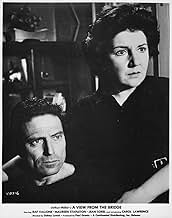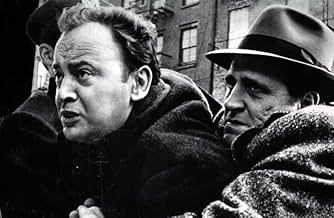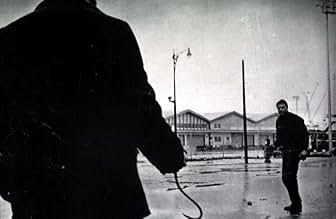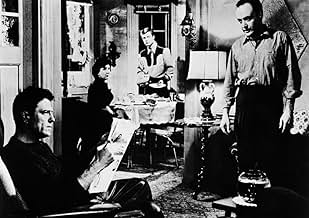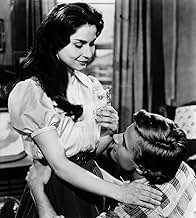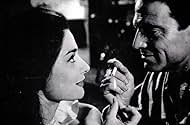Ajouter une intrigue dans votre langueEddie harbors secret love for his niece Catherine. When her cousins, illegal immigrants Marco and Rodolpho, arrive, Catherine falls for Rodolpho. Eddie, consumed by jealousy, reports the imm... Tout lireEddie harbors secret love for his niece Catherine. When her cousins, illegal immigrants Marco and Rodolpho, arrive, Catherine falls for Rodolpho. Eddie, consumed by jealousy, reports the immigrants, leading to tragic consequences.Eddie harbors secret love for his niece Catherine. When her cousins, illegal immigrants Marco and Rodolpho, arrive, Catherine falls for Rodolpho. Eddie, consumed by jealousy, reports the immigrants, leading to tragic consequences.
- Réalisation
- Scénario
- Casting principal
- Récompenses
- 1 victoire au total
Michel Mourlet
- Extra
- (non crédité)
Avis à la une
This comes from a particularly satisfying period in the career of Sidney Lumet. Based upon one of the masterpieces of American theatre, the exteriors are filmed in his beloved New York whilst the interiors are shot in France. It is a Franco-Italian production and having the three leading male protagonists speaking in broken English contributes immeasurably to the films authenticity.
It is pretty faithful to the original apart from the ending and in changing the role of the lawyer Alfieri from that of Greek chorus to the voice of reason. Longshoreman Eddie Carbone has no time for reason as he is ruled by the heart and not the head. Like so many tragic characters he is basically a decent man whose fatal flaw, in this case, his improper love for his teenage niece, destroys him.
Carbone here is played by ex-footballer Raf Vallone who belongs to that rare breed: a hunk who can act. He has given some strong portrayals in his time, notably in Dassin's 'Phaedra', but this powerhouse performance has it all and he is fully deserving of his David di Donatello award.
One of playwright Arthur Miller's favoured devices is to have what appears to be a happy domestic scene shattered by a catalyst which in this piece is the arrival of two of Mrs. Carbone's cousins from Italy. They are illegal immigrants but Eddie agrees to put them up and get them jobs on the docks. Tensions mount however as Carbone's beloved niece falls for one of them.......
The immigrants Marco and Rodolpho are played superbly by Raymond Pellegrin and Jean Sorel. This is, to my knowledge, Pellegrin's strongest role and Sorel of course was always underrated because of his impossibly good looks. Another performance to treasure is that of Carol Lawrence as the niece. An all round actress/singer/dancer she was denied the chance of reprising on screen her award winning stage role as Maria in 'West Side Story' and although on paper a wee bit too old for the part of Catherine, gives a magnificent performance. Sadly, this is her only film. As Mrs. Carbone we have the accomplished Maureen Stapleton, who combines strength and vulnerability. Mention must also be made of Morris Charnovsky as Alfieri. An excellent actor whose film career was scuppered after being 'named' by Elia Kazan to the HUAC.
Historically there is a strong connection between Kazan's 'On the Waterfront' and Miller's play, for those who care to look it up. Whereas in Kazan's film to inform is an act of heroism, here it is merely an act of betrayal.
Lumet's legendary skill with actors, Norman Rosten's screenplay, Michel Kelber's gritty cinematography and the beautifully understated score of Maurice Le Roux have given us a raw, stark, passionate, searing and visceral film which also seems to have served the playwright well. Let us hope Mr. Miller approved.
It is pretty faithful to the original apart from the ending and in changing the role of the lawyer Alfieri from that of Greek chorus to the voice of reason. Longshoreman Eddie Carbone has no time for reason as he is ruled by the heart and not the head. Like so many tragic characters he is basically a decent man whose fatal flaw, in this case, his improper love for his teenage niece, destroys him.
Carbone here is played by ex-footballer Raf Vallone who belongs to that rare breed: a hunk who can act. He has given some strong portrayals in his time, notably in Dassin's 'Phaedra', but this powerhouse performance has it all and he is fully deserving of his David di Donatello award.
One of playwright Arthur Miller's favoured devices is to have what appears to be a happy domestic scene shattered by a catalyst which in this piece is the arrival of two of Mrs. Carbone's cousins from Italy. They are illegal immigrants but Eddie agrees to put them up and get them jobs on the docks. Tensions mount however as Carbone's beloved niece falls for one of them.......
The immigrants Marco and Rodolpho are played superbly by Raymond Pellegrin and Jean Sorel. This is, to my knowledge, Pellegrin's strongest role and Sorel of course was always underrated because of his impossibly good looks. Another performance to treasure is that of Carol Lawrence as the niece. An all round actress/singer/dancer she was denied the chance of reprising on screen her award winning stage role as Maria in 'West Side Story' and although on paper a wee bit too old for the part of Catherine, gives a magnificent performance. Sadly, this is her only film. As Mrs. Carbone we have the accomplished Maureen Stapleton, who combines strength and vulnerability. Mention must also be made of Morris Charnovsky as Alfieri. An excellent actor whose film career was scuppered after being 'named' by Elia Kazan to the HUAC.
Historically there is a strong connection between Kazan's 'On the Waterfront' and Miller's play, for those who care to look it up. Whereas in Kazan's film to inform is an act of heroism, here it is merely an act of betrayal.
Lumet's legendary skill with actors, Norman Rosten's screenplay, Michel Kelber's gritty cinematography and the beautifully understated score of Maurice Le Roux have given us a raw, stark, passionate, searing and visceral film which also seems to have served the playwright well. Let us hope Mr. Miller approved.
I saw this when it was first released, but I've never seen it since, not even on Turner or AMC. I'd love to know why it sank out of sight. Perhaps because Raf Vallone was virtually unknown in the USA? (Maybe if it had starred Van Heflin, who originated the lead role on Broadway.) I am glad to see a new production of it is underway. With Miller's recent death, maybe it will attract the attention it deserves as Miller's homage to Greek tragedy adapted to the lives of "ordinary" working people and to modern stagecraft. After more than 40 years, I finally saw a stage production last night, by the University of Oregon Theater Arts Dept. For a college production it was more than adequate, despite the awful acoustics of their theater. The young actor who played Eddie Carbone was quite good. But it whetted my appetite for a professional production. It's available in VHS on Amazon, but I don't want to buy it, just watch it.
I just saw this excellent movie in a crappy DVD transfer, actually a DVD-R. It is also available on YouTube. As far as I can see it's the only version available in English at this time and there is no one in French although the movie was apparently shot also in French for the European market.
The setting of the Arthur Miller play in the docks may be surprising at first but it works, allowing parts of the story to take place in outdoors. One can recognize the director's legendary ability with the comedians. They look and sound so naturel that you could believe they have never played another role in their career. The dramatic tension reaches a peek in the third part of the movie. I was riveted to my TV set despite, again, the lousy quality of the support.
The setting of the Arthur Miller play in the docks may be surprising at first but it works, allowing parts of the story to take place in outdoors. One can recognize the director's legendary ability with the comedians. They look and sound so naturel that you could believe they have never played another role in their career. The dramatic tension reaches a peek in the third part of the movie. I was riveted to my TV set despite, again, the lousy quality of the support.
A View From The Bridge transcends its stage-play roots to give an earthy feel for its neighborhood and its neighbors. This is high praise considering the play is one of Arthur Miller's very best to begin with. The chemistry is devastatingly hot between Raf Vallone and his illicit love for niece Carol Lawrence who, at first admires him, but later turns on him with disgust. Maureen Stapleton is magnificent as Vallone's desperate wife. Vincent Gardenia is disarmingly young in an early role. The cinematography seems to peel the layers of this blue-collar area like an onion, and the score is simply perfect. A View from the Bridge is a neglected classic that needs to be restored to prominence.
Based on a play by Arthur Miller, the film is very typical of its era (where many such classic plays were adapted for the screen) but also characteristic of director Lumet - who was constantly striving to push barriers (among the themes touched upon here are incest and homosexuality!) and always put his greatest emphasis on the acting. In fact, the cast here is an eclectic but surprisingly effective mix of American, French and Italian actors (though set in Brooklyn, the film was actually shot in France!) - with Raf Vallone especially impressive in his difficult role. The film's dock-side setting (gloomily photographed by Michel Kelber) recalls, to a certain extent, ON THE WATERFRONT (1954) - though this is more of a domestic melodrama; still, the final confrontation between Vallone and Raymond Pellegrin (with its tragic aftermath) reaches a fine pitch of tension.
Le saviez-vous
- AnecdotesThe screen play is based on the stage play "A View From the Bridge" by Arthur Miller which opened at the Coronet Theater on September 29, 1955 and ran for 148 performances.
- Versions alternativesTwo separate versions were filmed: one in English, the other in French.
- ConnexionsFeatured in Celluloid Closet (1995)
Meilleurs choix
Connectez-vous pour évaluer et suivre la liste de favoris afin de recevoir des recommandations personnalisées
- How long is A View from the Bridge?Alimenté par Alexa
Détails
- Durée1 heure 58 minutes
- Couleur
- Rapport de forme
- 1.37 : 1
Contribuer à cette page
Suggérer une modification ou ajouter du contenu manquant

Lacune principale
By what name was Vu du pont (1962) officially released in Canada in English?
Répondre

